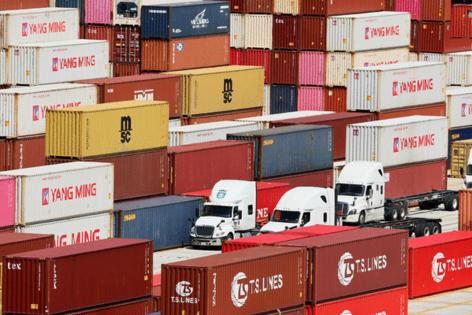Editorial: Trump's foolish tariffs take the US economy back centuries
Published in Op Eds
One thing you can say in favor of President Donald Trump’s announcement Wednesday from the Rose Garden: He did what he promised during the campaign.
For months as stock markets gyrated on news and rumors of Trump’s tariff plans, with the president making protectionist pronouncements and then backtracking in the face of resistance from affected industries, the overarching question in the minds of economists, institutional investors and company executives has been, “Will he really go through with it?” Will he really risk the future of the U.S. economy on an economic philosophy that dates back centuries?
We have our answer. He meant it. And he means it.
Like it or not, Trump has just launched a full-scale global trade war.
It wasn’t a surprise attack, certainly. But the audacity of the plan stuns nonetheless.
The rudimentary chart Trump held up as he was speaking Wednesday afternoon depicted percentages that he claimed various countries were charging U.S. companies when they sold into those nations’ markets.
Interestingly, the percentages didn’t include only the tariffs those countries charge (and those, of course, are different for different types of products); they also took into account other harder-to-quantify effects such as “currency manipulation” and so-called VAT in Europe and elsewhere, which generally are applied equally whether a product is made domestically or abroad.
In other words, these country-by-country “tariffs” President “Reciprocity” claims are being assessed on the U.S. are open to definitional question. To say the least.
China, for example, was pegged at an overall tariff percentage of 67%. Trump said the U.S. would respond in kind by levying a percentage at half the rate he claimed countries were charging American companies and business people. So in China’s case, the U.S. tariff on Chinese goods will be 34%.
And on it went. A new U.S. tariff of 20% on European Union products (sorry, wine drinkers.) A new U.S. tariff of 46% on Vietnam (sorry, sneaker buyers). The list includes dozens of countries, including such economic powerhouses as Montenegro, Chad, Rwanda and Vanuatu.
For any countries not targeted by the Trump administration’s tariffs, their goods sold into the U.S. will have to pay a 10% tariff. So no one escapes whether they have barriers to U.S. goods or not.
“It’s our declaration of economic independence,” Trump said. “These tariffs are going to give us growth like you’ve never seen before.”
That’s not usually the way trade wars play out. They raise prices for consumers very rapidly (these tariffs went into effect at midnight), and any adjustments importers and manufacturers make to build new plants and otherwise adjust their supply chains take significant periods of time.
The U.S. consumer accounts for about 70% of the U.S. gross domestic product. With purchasing power depleted, the consumer’s dollar does not go as far. Thus consumers typically rein in spending on things they can survive without.
Ergo, the risk of recession. And if you combine recession with higher prices, you get that most dreaded economic plague of all — stagflation.
Trump said a big reason for this protectionist broadside was to help boost manufacturing in the U.S. He claimed that foreign-owned companies now will be more likely to build factories in the U.S. in order to sell more cheaply to American consumers.
The National Association of Manufacturers wasn’t buying it any more than this editorial board. “The high costs of new tariffs threaten jobs, supply chains and, in turn, America’s ability to outcompete other nations and lead as the preeminent manufacturing superpower,” association President Jay Timmons said in a statement.
We will see in the coming days how markets respond, and most importantly, how the rest of the world responds. Some countries will be better equipped to retaliate than others. But retaliation of some form is assured. And then, of course, Trump is likely to respond yet again to those who react.
That’s how trade wars go. Welcome, folks, to the return of mercantilism, the dominant economic philosophy of the 16th, 17th and 18th centuries.
We understand that the increasingly global economy has extracted some pain on the workers within this and other countries and that the world has its share of disingenuous nations when it comes to so-called free trade. In part, that is why Trump was returned to power.
But we’ve always been on the side of open markets and free competition. And believe Americans of all stripes prefer a growing economy to the consequences of a trade war, unintended or not.
_____
©2025 Chicago Tribune. Visit chicagotribune.com. Distributed by Tribune Content Agency, LLC.




























































Comments